Whether it’s a stain caused by oil, water, or something else entirely, you’ll find stain removal instructions in this post to help restore your white marble to its former glory!
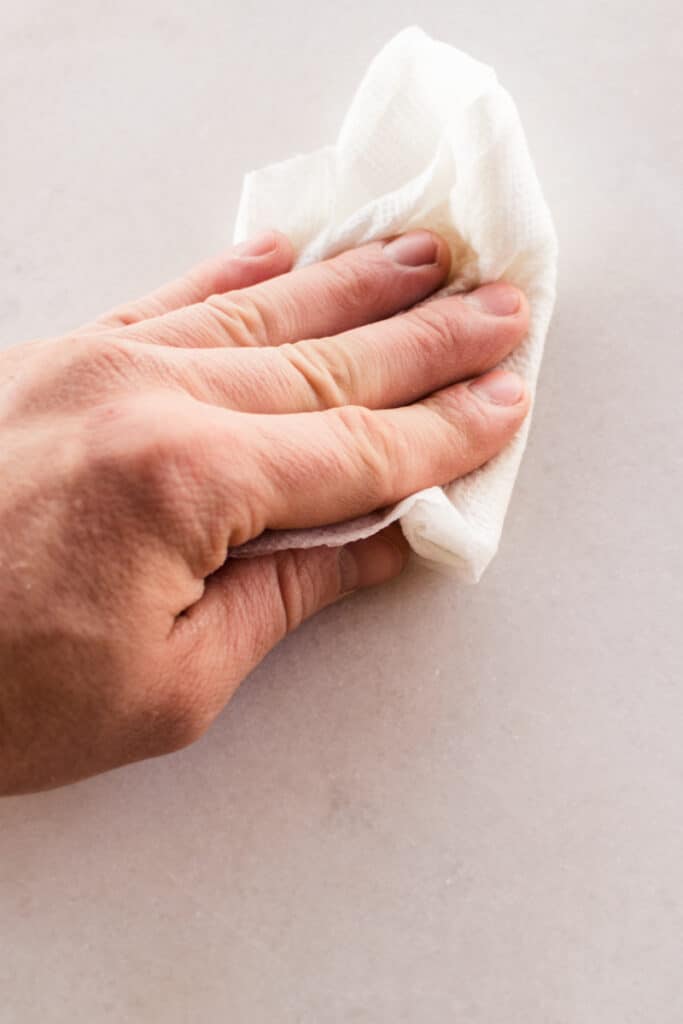
Exquisite in beauty yet equally porous and prone to marks and stains, white marble surfaces require extra special care and attention.
After all – you want to keep that glorious marble appearance fresh and vibrant.
So first off, don’t panic! If you notice a stain or mark – this post will come to the rescue.
Whatever has caused the stain, marble has a good chance of being recovered using non-toxic cleaners which are safe, effective, and kind to the environment.
In this post, I’ll share several methods for how to remove stains from white marble. Depending on what caused the stain, whether it’s water, oil, or something else entirely, you’ll find an answer.
So relax, safe in the knowledge that your marble tops can be glorious once again!
It’s worth mentioning, that these steps are not necessary for composite stone material. Composite materials such as composite sinks, are not porous and do not require the same cleaning methods.
You can learn how to clean a composite sink here.
does marble stain easily
Being a natural stone mined straight from the earth, white marble is far more likely to show marks and absorb stains than man-made materials.
This is just the way nature works. The natural crystalization process that makes marble what it is means it’s sensitive by design.
Any spills or scratches are more likely to show on a marble surface compared to, say, a laminate floor or man-made, plastic-coated worktop.
That’s not to say you need to be paranoid about your marble countertops; of course not. After all, they are practical equally as much as how gorgeous they look.
But it’s worthwhile keeping an eye on your marble surfaces – particularly if you’ve got kids whose little fingers can easily knock over a glass of water or cup of coffee.
This post contains affiliate links, which means I make a small commission at no extra cost to you. Get my full disclosure HERE.
how to get stains out of white marble
The stain removal instructions below all depend on what caused the stain in the first place.
First off, before you attack the marble stain with this homemade marble stain remover – do a test on a small area to check for colorfastness.
A great place to test is underneath your marble countertop or behind it if you can gain access.
Or, perhaps you’ve got a leftover piece of marble from when the countertops were installed? This would be great to test on prior to use.
how to remove water stains from marble
It’s worth being aware that water stains on marble tend to be caused most often by hard water.
For water stains, all you need to do is grab a damp cloth and apply a little dish detergent to wipe over the stain in a circular motion until clean.
how to remove stains from marble with baking soda
Baking soda is useful when you’re removing oil-based stains from white marble. You’ll find that simply wiping the stain will not do the trick as those stains absorb into the stone.
First off, wipe over the stain with a soft damp cloth (microfiber cloths are great)
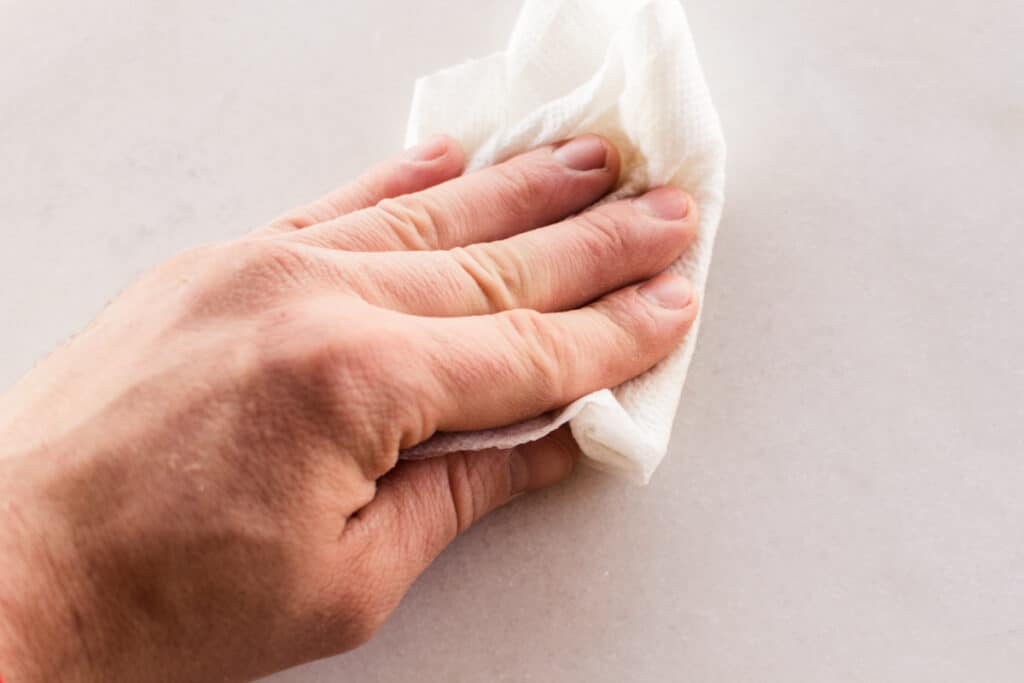
Then mix 1/4 cup of baking soda with a tablespoon of 3% hydrogen peroxide (be sure to only use hydrogen peroxide on white marble).
Add warm water to make a paste.
You then need to spread this paste over the affected area to dry overnight.
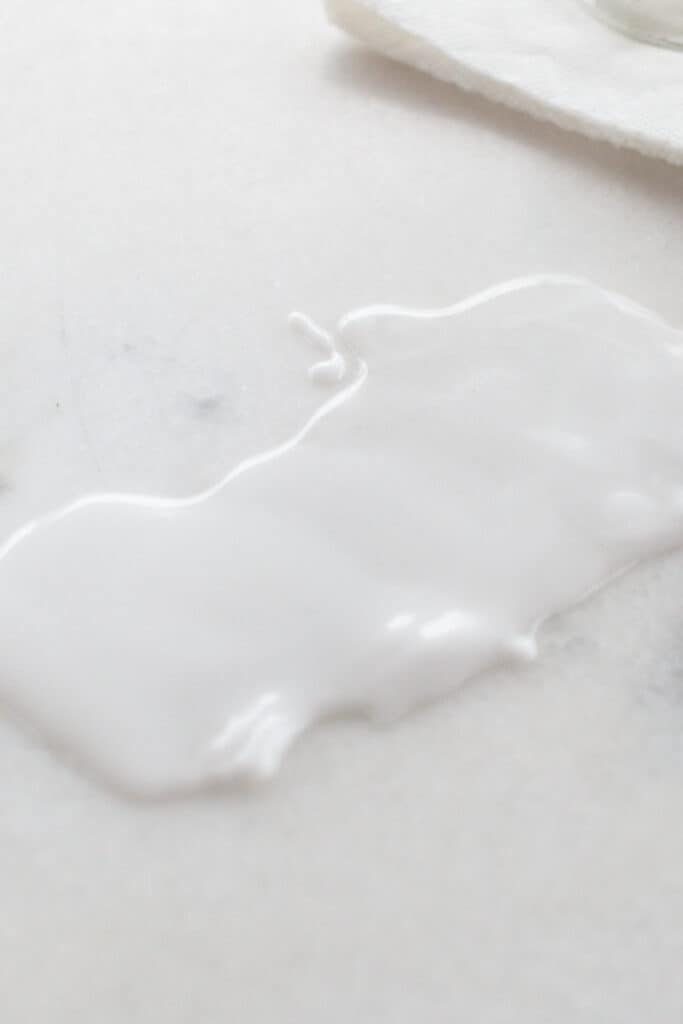
In the morning, scrape the paste off with a plastic or wooden scraper (never anything metal, as this could scratch).
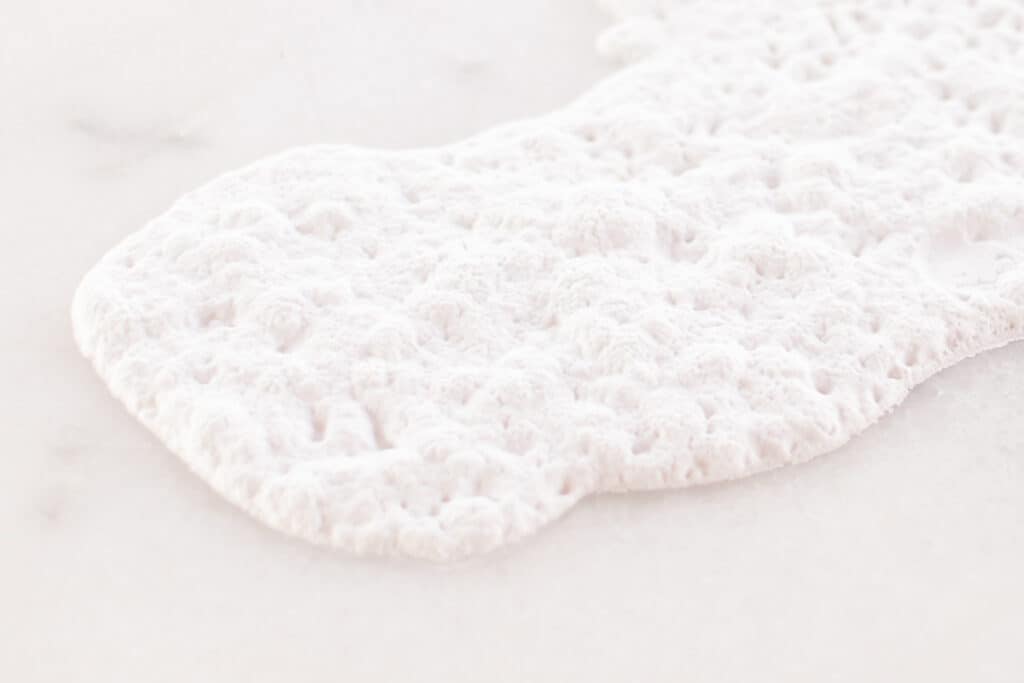
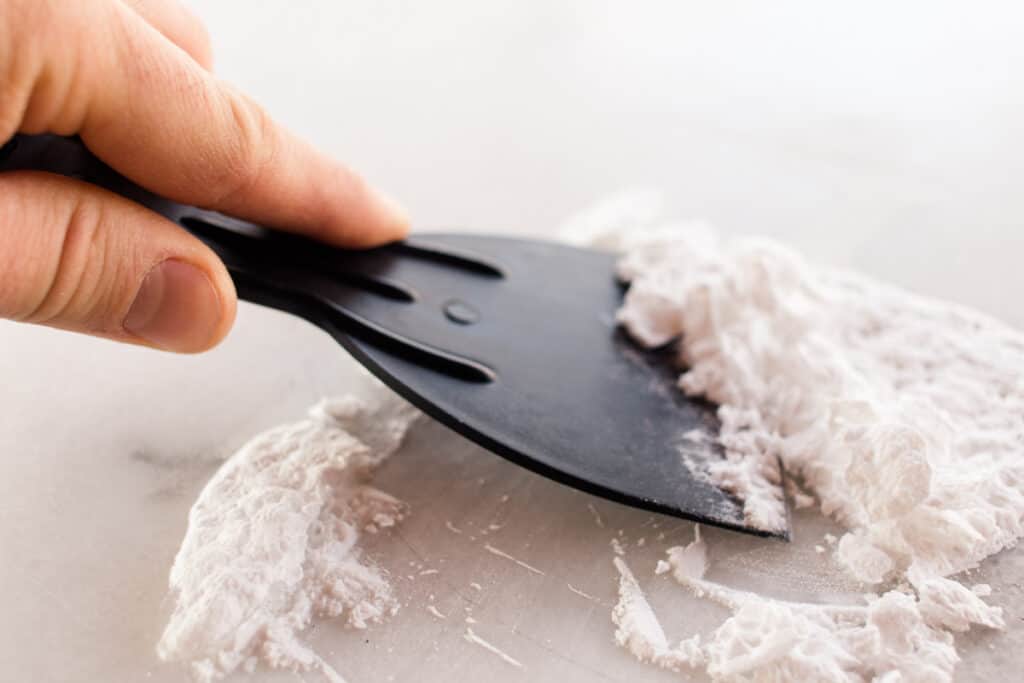
Wipe clean with soap and water, then dry thoroughly
Repeat again if necessary
Safety note: Never use hydrogen peroxide on dark marble, as it can lighten the color significantly. Only use on white marble.
how to get generic stains out of marble
Sometimes it’s hard to know what caused a stain, particularly if you’re not sure how long it’s been there for.
In cases like this, follow these instructions:
First, wipe the area clean with a damp, soft cloth.
Next, soak a paper towel with a 3% hydrogen peroxide solution to cover the stain.
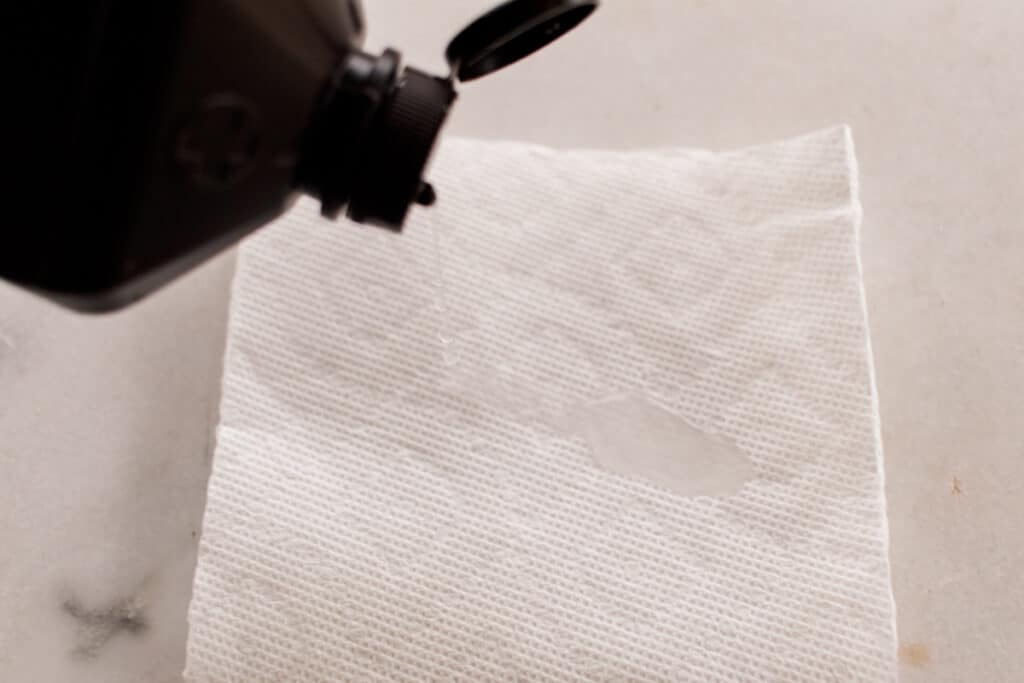
Place a weight, such as a glass mason jar, on the towel to weigh it down overnight. In the morning, remove the towel, wipe the area clean with a damp cloth, and pat it dry.
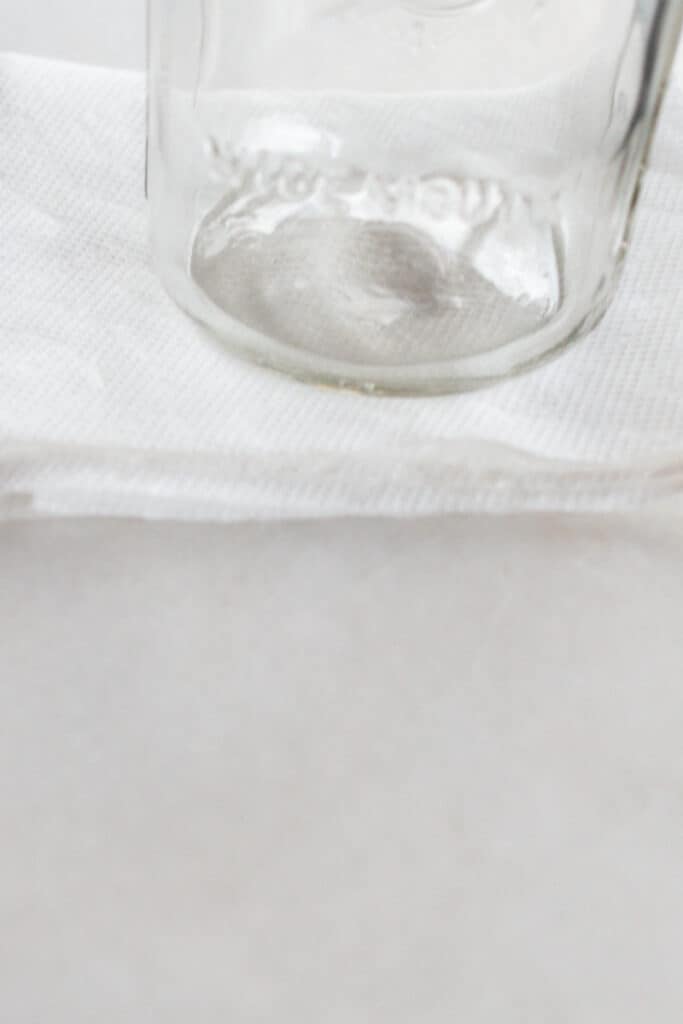
Repeat if necessary.
helpful tips
You do hear horror stories about certain products interacting and damaging marble countertops and surfaces, so I hope these tips here help calm any worries you may have.
Products that do pose a risk to white marble tend to be full of synthetic materials, such as multi-surface cleaners.
The things you need to know for sure are never, ever to use anything acidic on marble. Things like bleach or vinegar are a big no-no.
Check out this stain remover here for non-marble-related stains.
You want to look for a surface cleaner that is neutral in its PH value. This is because marble is made up of calcium carbonate, which is soft by nature, just like other types of natural stone.
Anything acidic is too harsh and risks damaging white marble significantly. Equally, anything which might scrape or scratch the surface – avoid all those abrasive scrubbing brushes like the plague!
I have a lovely granite cleaner recipe that is suitable for all-natural stone surfaces and is safe to use with a soft cloth on white marble.
And whatever you do, don’t use hydrogen peroxide solution on dark marble.
Else you risk ending up with white spots all over it. Hydrogen peroxide has a gentle lightening action on white marble which is why it’s great as a stain remover on white marble only.
Final tips
All the things I’ve suggested in this post are to help recover white marble and retain its original appearance.
This comes down to the fact that white marble does require regular care to keep it looking great.
If you notice something spill on your marble tops, immediately wipe it off. Stains happen because marble is porous, meaning it absorbs other materials into it.
You’ve got a good chance that no stain will ever happen if you do wipe it up straight away after spills.
Of course, I know, in reality, that this isn’t always possible! This is where these stain removal tips will come in useful.
If you found this post helpful, consider reading some of my other home-cleaning recipes.
- How to clean upholstery
- How to unclog a bathroom sink
- Cleaning windows with vinegar
- How to clean carpet (or carpet odor removal tips)
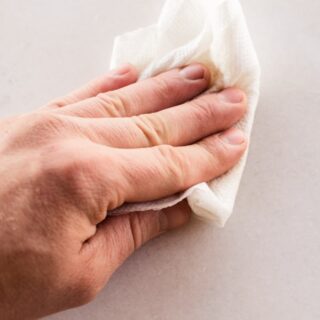
Getting Stains out of Marble
Equipment
- Plastic scrapper
Ingredients
- Baking soda
- Soft cloth
- Hydrogen Peroxide
- Paper towel
- Dish detergent
Instructions
how to remove water stains from marble
- Grab a damp cloth and apply a little dish detergent to wipe over the stain in a circular motion until clean.
- (It’s worth being aware that water stains on marble tend to be caused by hard water only.)
how to remove stains from marble with baking soda (great for oil-based stains)
- Wipe over the stain with a soft damp cloth (microfiber cloths are great)
- Mix 1/4 cup of baking soda with a tablespoon of 3% hydrogen peroxide (note: only use hydrogen peroxide on white marble!)
- Add warm water to make a paste.
- Spread this paste over the affected area to dry overnight. (you can also cover it with plastic wrap)
- In the morning, scrape the paste off with a plastic or wooden scraper (never anything metal, as this could scratch).
- Wipe clean with soap and water, then dry thoroughly
- Repeat again if necessary
how to remove stains without baking soda
- Wipe the area clean with a damp, soft cloth.
- Soak a paper towel with a 3% hydrogen peroxide solution to cover the stain.
- Place a weight, such as a glass mason jar, on the towel to weigh it down overnight.
- In the morning, remove the towel, wipe the area clean with a damp cloth, and pat it dry.
- Repeat if necessary.
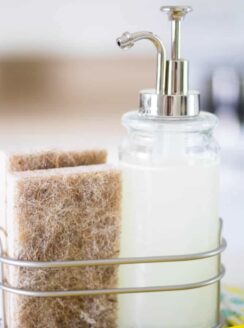
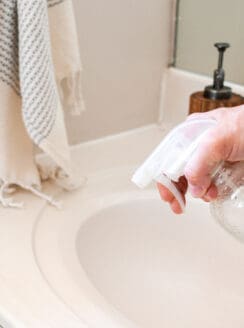
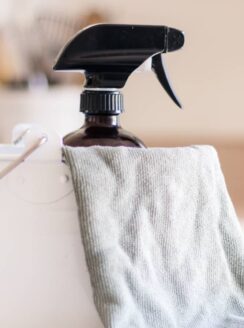
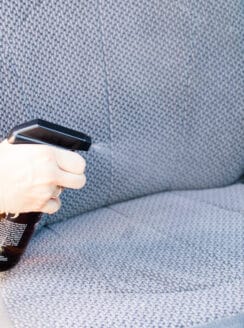
Nicholas says
Just wanted to let everyone know that the hydrogen peroxide of 3% and baking soda removed tea stains out of my marble that were 2-3 weeks old. I didn’t leave it over night, but maybe 2-3 hours. wipe off and it was clean. Impressed. Really had little hope for it. It was an unsealed pastry board that I was using as a countertop for my nightstand, to be specific. Thank you!
Kathy says
So, I have black marble countertops, and I have HORRIBLE water stains by the faucet. Do I just use baking soda and follow your directions or is there another option? thanks.
Laura says
This one always works great for me!
Rachell Benesch says
“Thanks for sharing this post. I learned a lot from it and I appreciate the time and effort you put into it.